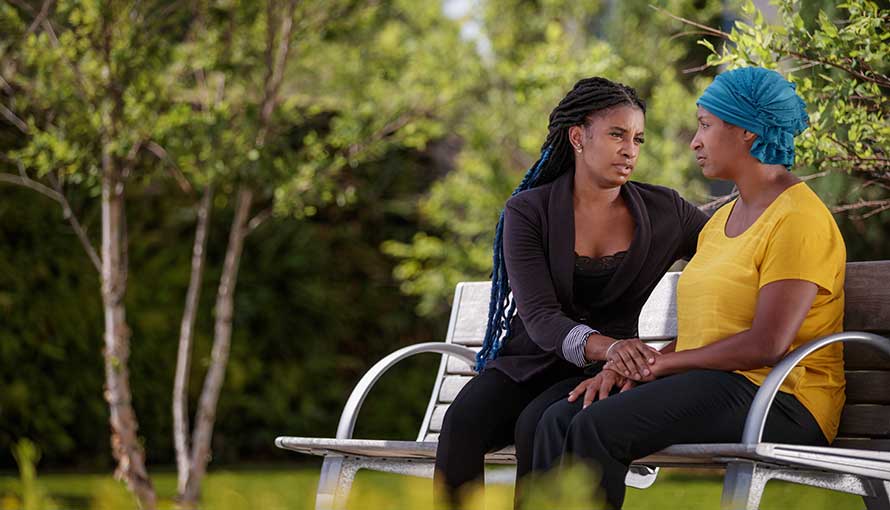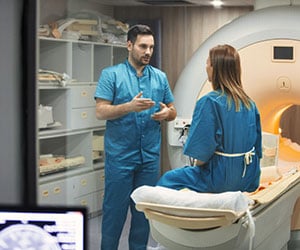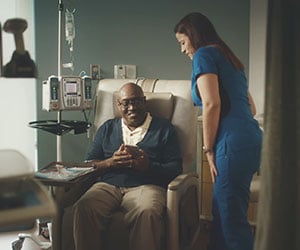New Cancer Diagnosis

Cancer care has improved remarkably in recent years, and through the tireless work of many dedicated scientists, additional strides are being made every single day. Even so, more than 1 million Americans are diagnosed each year, many without warning.
In the immediate aftermath of a new cancer diagnosis, it’s natural to experience a variety of strong emotions ranging from sadness and anger to disbelief and fear. Learning what you can expect in the days that lie ahead—and planning how you will proceed—can help you cope with the stress and uncertainty and gain some much-needed control over your situation.
The pros & cons of internet research
As you educate yourself about your condition, you may want to surf the internet, which offers instant access to boundless information about virtually any topic. Just keep in mind that the information you find could be from reliable health experts, government agencies or universities—but it could also be from merchants, special interest groups, the general public or scam artists. Therefore, you’ll need to carefully consider your sources.
Additionally, any health-related information you find on the internet—even on highly regarded and trustworthy websites—should be considered general information and nothing more. In other words, it might not apply to you at all. While you may want to use it for basic educational purposes, you should not use it to make important treatment decisions.
Your best resource is always your doctor
 As with any health-related issue, your best source of information about your new cancer diagnosis is your doctor. There’s simply no substitute for sitting face to face with a health care provider who is familiar with your medical history and your unique type of cancer and can examine you, discuss how you’re feeling and answer your specific questions. Of course, it can be helpful to know where to begin. Here are four important questions you’ll want to ask your doctor about your new cancer diagnosis:
As with any health-related issue, your best source of information about your new cancer diagnosis is your doctor. There’s simply no substitute for sitting face to face with a health care provider who is familiar with your medical history and your unique type of cancer and can examine you, discuss how you’re feeling and answer your specific questions. Of course, it can be helpful to know where to begin. Here are four important questions you’ll want to ask your doctor about your new cancer diagnosis:
1. Is my cancer treatable?
This is an excellent starting point for a discussion about a new cancer diagnosis. You’ll want to find out the name of the specific type of cancer you have, where it originated in your body and whether it has spread. Within the general context of cancer, you may often come across the term “stage,” which doctors use as a frame of reference when discussing a tumor. Essentially, as part of the diagnostic process, each tumor is assigned a number ranging from 0 to 4, which helps to describe where the cancer is located and whether it has spread.
Your doctor will carefully consider all of this information, along with your overall health and personal preferences, to determine whether your cancer is treatable and, if so, the best approach to treatment.
2. How much experience do you have in treating my specific condition?
Cancer is a complex disease that encompasses more than 100 distinct conditions. Therefore, you’ll want to work with a specialist who has experience in treating your specific type of cancer and is affiliated with a high-volume cancer center such as Moffitt Cancer Center. Recent studies have established a link between higher patient volumes and better patient outcomes, which underscores the ability of a high-volume cancer center to provide its patients with access to better expertise and resources.
While you may feel a bit awkward about quizzing your doctor about his or her experience, you should know that doctors expect—and welcome—these types of questions. Your doctor will want you to feel completely comfortable and confident in his or her care, not intimidated.
3. What are my treatment options?
 Once you find the right specialist and gain a better understanding of the type of cancer you are dealing with, you’ll want to find the best way to address it. Most likely, you’ll have decisions to make. Your doctor can help you identify your options and fully explain the goals, risks, benefits and possible side effects of each. He or she can also provide a professional opinion to help ensure that you can make fully informed decisions with confidence.
Once you find the right specialist and gain a better understanding of the type of cancer you are dealing with, you’ll want to find the best way to address it. Most likely, you’ll have decisions to make. Your doctor can help you identify your options and fully explain the goals, risks, benefits and possible side effects of each. He or she can also provide a professional opinion to help ensure that you can make fully informed decisions with confidence.
To help you achieve the best possible results and quality of life, your doctor may suggest that you try more than one type of cancer therapy. For instance, your individualized treatment plan could include surgery paired with radiation therapy or chemotherapy.
4. Can you refer me to a colleague for a second opinion?
As you try to make sense of your cancer diagnosis, you might naturally wonder if another doctor might have a different take on your test results, provide you with more information or offer you a different treatment option. Getting a second opinion can provide valuable reassurance that makes you feel more confident in both your diagnosis and treatment plan.
If you are worried about offending your doctor or harming your relationship with him or her by asking for a second opinion, don’t be. Remember: It is common to receive a second opinion about a cancer diagnosis, and as a patient, you have a right to seek one (or more). Your doctor will understand this and encourage you to do so.
Knowledge is power
 As you learn about your cancer diagnosis, you will be presented with an overwhelming amount of new and unfamiliar information. If possible, have a trusted family member or friend present during your discussion with your doctor. Moffitt is founded on Patient and Family-Centered Care, which is the understanding that the family plays a vital role in ensuring the health and well-being of patients of all ages.
As you learn about your cancer diagnosis, you will be presented with an overwhelming amount of new and unfamiliar information. If possible, have a trusted family member or friend present during your discussion with your doctor. Moffitt is founded on Patient and Family-Centered Care, which is the understanding that the family plays a vital role in ensuring the health and well-being of patients of all ages.
Be sure to take notes and ask the doctor to explain anything you find unclear. When it comes to cancer, knowledge is power, and well-informed patients make the best treatment decisions.
Moffitt Cancer Center welcomes patients at all stages of their cancer journey. If you’d like to discuss your diagnosis with a specialist at Moffitt, you can request an appointment by calling 1-888-663-3488 or submitting a new patient registration form. Then, click here for some helpful tips on how to prepare for your appointment.
Helpful Links:
Find a Doctor
Cancer Diagnostics and Treatments
Find a Clinical Trial
Preparing for Your Appointment
Contact us today to schedule an appointment. Call us at 1-888-663-3488 or request an appointment online.
Preparing For Your Appointment
- Patient and Family Orientation
- Medical Records
- Appointment Reminder Service
- MyMoffitt Patient Portal
- New Cancer Diagnosis
- Online Registration Frequently Asked Questions
- Scheduling Your Appointment
- Traveling for Cancer Treatment
- Preparing For Your Hospitalization
- Preparing For Your Surgery
- Visitor Policy
- Patient Rights and Responsibilities
